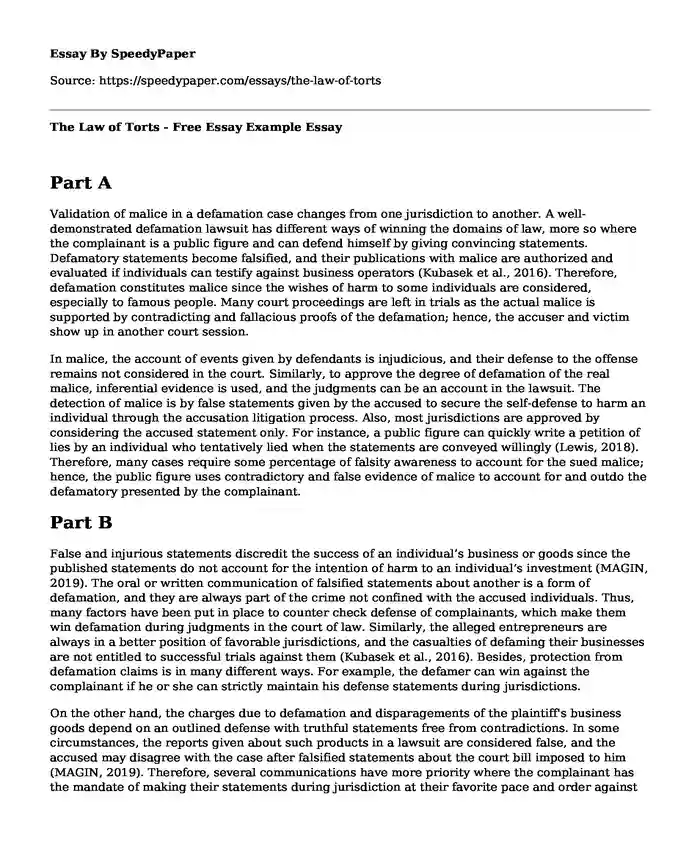
| Essay type: | Definition essays |
| Categories: | Law Court system Judicial system |
| Pages: | 3 |
| Wordcount: | 687 words |
Part A
Validation of malice in a defamation case changes from one jurisdiction to another. A well-demonstrated defamation lawsuit has different ways of winning the domains of law, more so where the complainant is a public figure and can defend himself by giving convincing statements. Defamatory statements become falsified, and their publications with malice are authorized and evaluated if individuals can testify against business operators (Kubasek et al., 2016). Therefore, defamation constitutes malice since the wishes of harm to some individuals are considered, especially to famous people. Many court proceedings are left in trials as the actual malice is supported by contradicting and fallacious proofs of the defamation; hence, the accuser and victim show up in another court session.
In malice, the account of events given by defendants is injudicious, and their defense to the offense remains not considered in the court. Similarly, to approve the degree of defamation of the real malice, inferential evidence is used, and the judgments can be an account in the lawsuit. The detection of malice is by false statements given by the accused to secure the self-defense to harm an individual through the accusation litigation process. Also, most jurisdictions are approved by considering the accused statement only. For instance, a public figure can quickly write a petition of lies by an individual who tentatively lied when the statements are conveyed willingly (Lewis, 2018). Therefore, many cases require some percentage of falsity awareness to account for the sued malice; hence, the public figure uses contradictory and false evidence of malice to account for and outdo the defamatory presented by the complainant.
Part B
False and injurious statements discredit the success of an individual’s business or goods since the published statements do not account for the intention of harm to an individual’s investment (MAGIN, 2019). The oral or written communication of falsified statements about another is a form of defamation, and they are always part of the crime not confined with the accused individuals. Thus, many factors have been put in place to counter check defense of complainants, which make them win defamation during judgments in the court of law. Similarly, the alleged entrepreneurs are always in a better position of favorable jurisdictions, and the casualties of defaming their businesses are not entitled to successful trials against them (Kubasek et al., 2016). Besides, protection from defamation claims is in many different ways. For example, the defamer can win against the complainant if he or she can strictly maintain his defense statements during jurisdictions.
On the other hand, the charges due to defamation and disparagements of the plaintiff's business goods depend on an outlined defense with truthful statements free from contradictions. In some circumstances, the reports given about such products in a lawsuit are considered false, and the accused may disagree with the case after falsified statements about the court bill imposed to him (MAGIN, 2019). Therefore, several communications have more priority where the complainant has the mandate of making their statements during jurisdiction at their favorite pace and order against the accuser. This, cause them to have a say on their defamatory statements when their evidence becomes obsolete after some time of judgment.
However, the accused can make alternative statements as compared to the previous ones during the court session, and he cannot be charged with defamation malice but given a lot of priority. The defamatory statement also becomes libel if an individual has alternative and distinct alleged statements during proceedings break in a lawsuit. During a judicial proceeding, the review of statements of defamer takes, and his feedback is protection against defamation and disparagement since there will be no evidence to prove the accused in the lawsuit.
References
Lewis, D. (2018). Whistleblowing and Law of Defamation: Does the Law Strike a Fair Balance Between the Rights of Whistleblowers, the Media, and Alleged Wrongdoers?. Industrial Law Journal, 47(3), 339-364. https://sci-hub.tw/https:/academic.oup.com/ilj/article-abstract/47/3/339/4210465
MAGIN, E. G. G. (2019). THE RISKS OF DEFAMATION: AN ANALYSIS INTO THE DRIVING FACTORS DETERMINING THE OUTCOME OF COMMERCIAL DEFAMATION CASES (Doctoral dissertation, MAASTRICHT UNIVERSITY). https://www.researchgate.net/profile/Elias_Magin/publication/339509176_The_Risks_of_Defamation_An_Analysis_into_the_Driving_Factors_Determining_the_Outcome_of_Commercial_Defamation_Cases/links/5e56949f4585152ce8f25141/The-Risks-of-Defamation-An-Analysis-into-the-Driving-Factors-Determining-the-Outcome-of-Commercial-Defamation-Cases.pdf
Kubasek, Nancy K., Bartley A. Brennan, and M. Neil Browne.legal environment of business: A critical thinking approach. Pearson, 2016. https://books.google.co.ke/books?id=ZRgWswEACAAJ&dq=Kubasek,+Nancy+K.,+Bartley+A.+Brennan,+and+M.+Neil+Browne.+The+legal+environment+of+business:+A+critical+thinking+approach.+Pearson,+2016.&hl=en&sa=X&ved=2ahUKEwi2kfGX5snqAhXC8eAKHfToDg0Q6AEwAHoECAYQAg
Cite this page
The Law of Torts - Free Essay Example. (2023, Oct 11). Retrieved from https://speedypaper.com/essays/the-law-of-torts
Request Removal
If you are the original author of this essay and no longer wish to have it published on the SpeedyPaper website, please click below to request its removal:
- Free Essay for Students on Legalizing Marijuana
- Free Essay on Discretion and the Criminal Justice Professional for Judges
- Free Essay Example. Standardized Contracts
- Essay Example on Conner's Moral Dilemma
- Paper Example. Police Policies in Communal Integration
- Free Essay - Arrest and Detention
- Essay Sample on Drugs and Victimization
Popular categories




